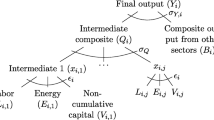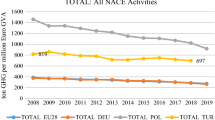Abstract
To what extent do the welfare costs associated with the implementation of the Burden Sharing Agreement in the European Union depend on sectoral allocation of emissions rights? What are the prospects for strategic climate policy to favor domestic production? This paper attempts to answer those questions using a CGE model featuring a detailed representation of the European economies. First, numerical simulations show that equalizing marginal abatement costs across domestic sectors greatly reduces the burden of the emissions constraint but also that other allocations may be preferable for some countries because of pre-existing tax distortions. Second, we show that the effect of a single country's attempt to undertake a strategic policy to limit impacts on its domestic energy-intensive industries has mixed effects. Exempting energy-intensive industries from the reduction program is a costly solution to maintain the international competitiveness of these industries; a tax-cum-subsidy approach is shown to be better than exemption policy to sustain exports. The welfare impact either policy – exemption or subsidy – on other European countries is likely to be small because of general equilibrium effects.
Similar content being viewed by others
References
M. Babiker, M. Bautista, H. Jacoby and J. Reilly, Effects of differentiating climate policy by sector: a United States example, MIT Joint Program on the Science and Policy of Global Change, Report no 61, Cambridge, MA (2000).
M. Babiker and R. Eckaus, Rethinking the Kyoto emissions targets, MIT Joint Program on the Science and Policy of Global Change, Report no 65, Cambridge, MA (2000).
M. Babiker and H. Jacoby, Developing country effects of Kyoto-type emissions restrictions, MIT Joint Program on the Science and Policy of Global Change, Report no 53, Cambridge, MA (1999).
M. Babiker, J. Reilly, M. Mayer, R. Eckaus, I. Sue Wing and R. Hyman, The MIT Emissions Prediction and Policy Analysis (EPPA) model: revisions, sensitivities, and comparisons of results, MIT Joint Program on the Science and Policy of Global Change, Report no 71, Cambridge, MA (2000).
M. Babiker, J. Reilly and D. Ellerman, Japanese nuclear power and the Kyoto agreement, Journal of the Japanese and International Economies 14 (2000) 169–188.
M. Babiker, J. Reilly and H. Jacoby, The Kyoto protocol and developing countries, Energy Policy 28 (2000) 525–536.
S. Barrett, Strategic environmental policy and international trade, Journal of Public Economics 54 (1994) 325–338.
A. Bernard and M. Vielle, Coût pour l'Europe d'une non-participation aux permis négociables et risque de délocalisation des industries intensive en énergie dans le cadre du protocole de Kyoto, mimeo, Paris (2001).
J. Bhagwati and V.K. Ramaswami, Domestic distortions, tariffs and the theory of optimal subsidy, Journal of Political Economy 71(1) (1963) 44–50.
C. Böhringer and T.F. Rutherford, Carbon taxes with exemptions in an open economy: a general equilibrium analysis of the German tax initiative, Journal of Environmental Economics and Management 32(2) (1997) 189–203.
A.L. Bovenberg and L.H. Goulder, Optimal environmental taxation in the presence of other taxes: General-equilibrium analyses, American Economic Review 86 (1996) 985–1000.
A.L. Bovenberg and R. de Mooij, Environmental levies and distortionary taxation, American Economic Review 94 (1994) 1085–1089.
P. Criqui, POLES 2.2., JOULE II Programme, European Commission DG XVII-Science Research Development, Brussels (1996).
P. Criqui, S. Mima and L. Viguier, Marginal abatement costs of CO2 emission reductions, geographical flexibility and concrete ceilings: an assessment using the POLES model, Energy Policy 27 (1999) 585–601.
P. Criqui and L. Viguier, Trading rules for CO2 emission permits systems: a proposal for ceilings on quantities and prices, Working Paper 18, IEPE, Grenoble, France (2000).
P. Criqui and L. Viguier, Kyoto and technology at world level: Costs of CO2 reduction under flexibility mechanisms and technical progress, International Journal of Global Energy Issues 14 (2000) 155–168.
A.K. Dixit and A.S. Kyle, The use of protections and subsidies for entry promotion and deterrence, American Economic Review 75(1) (1985) 139–152.
A.D. Ellerman, Tradable permits for greenhouse gas emissions: A primer with particular reference to Europe, MIT Joint Program on the Science and Policy of Global Change, Report no 69, Cambridge, MA (2000).
A.D. Ellerman and A. Decaux, Analysis of post-Kyoto CO2 emissions trading using marginal abatement curves, MIT Joint Program on the Science and Policy of Global Change, Report no 40, Cambridge, MA (1998).
A.D. Ellerman and I. Sue Wing, Supplementarity: an invitation to monopsony?, The Energy Journal 21(4) (2000) 29–59.
European Commission, Green paper on greenhouse gas emissions trading within the European Union, Brussels, COM(2000)87, Brussel (2000).
Consumption Expenditures of Private Households in the European Union (Eurostat, Luxemburg, 1999).
D. Fullerton and G.E. Metcalf, environmental taxes and the doubledividend hypothesis: did you really expect something for nothing?, National Bureau of Economic Research, Working paper no 6199, Cambridge, MA (1997).
T.W. Hertel, Global Trade Analysis: Modeling and Applications (Cambridge University Press, Cambridge, 1997).
Energy Statistics of OECD Countries 1995-1996 (International Energy Agency, Paris, 1998).
Energy Balances of OECD Countries 1995-1996 (International Energy Agency, Paris, 1998).
Energy Prices and Taxes, third quarter 1999 (International Energy Agency, Paris, 2000).
H. Jacoby, R. Eckaus, D. Ellerman, R. Prinn, D. Reiner and Z. Yang, CO2 emissions limits: economic adjustments and the distribution of burdens, MIT Joint Program on the Science and Policy of Global Change, Report no 9, Cambridge, MA (1997).
H. Jacoby and I. Sue Wing, Adjustment time, capital malleability and policy cost. Special Issue: The costs of the Kyoto Protocol: a multimodel evaluation, The Energy Journal (1999) 73–92.
J. Jensen, Carbon abatement policies with assistance to energy intensive industry, Draft #2, MobiDK Project, Ministry of Business and Industry, Copenhagen (1998).
P.R. Krugman, Domestic distortions and the deindustrialization hypothesis, NBER Working Paper Series, #5473, Cambridge, MA (1996).
W.J. McKibbin, M.T. Ross, R. Shackleton and P.J. Wilcoxen, Emissions trading, capital flows and the Kyoto Protocol, in: Economic Impact of Mitigation Measures, Proceedings of IPCC Working Group III: Mitigation of Climate Change, eds. J. Pan., N. van Leeuwen, H. Timmer and R. Swart (The Hague, 1999).
I.W.H. Parry, Pollution taxes and revenue recycling, Journal of Environmental Economics and Management 29 (1995) S64–S77.
J. Reilly, R.G. Prinn, J. Harnisch, J. Fitzmaurice, H. Jacoby, Kicklighter, D., Stone, P., Sokolov and A., Wang, Multi-gas assessment of the Kyoto Protocol, MIT Joint Program on the Science and Policy of Global Change, Report no 45, Cambridge, MA (1999).
J.P. Weyant, The costs of the Kyoto Protocol: a multi-model evaluation, The Energy Journal, Special issue (1999).
L. Viguier, Fair trade and harmonization of climate policies in Europe, Energy Policy 29(10) (2001) 749–753.
L. Viguier, M. Babiker and J. Reilly, The costs of the Kyoto Protocol in the European Union, Energy Policy 31(5) (2003) 459–481.
Author information
Authors and Affiliations
Rights and permissions
About this article
Cite this article
Babiker, M.H., Criqui, P., Ellerman, A.D. et al. Assessing the Impact of Carbon Tax Differentiation in the European Union. Environmental Modeling & Assessment 8, 187–197 (2003). https://doi.org/10.1023/A:1025543207122
Issue Date:
DOI: https://doi.org/10.1023/A:1025543207122




